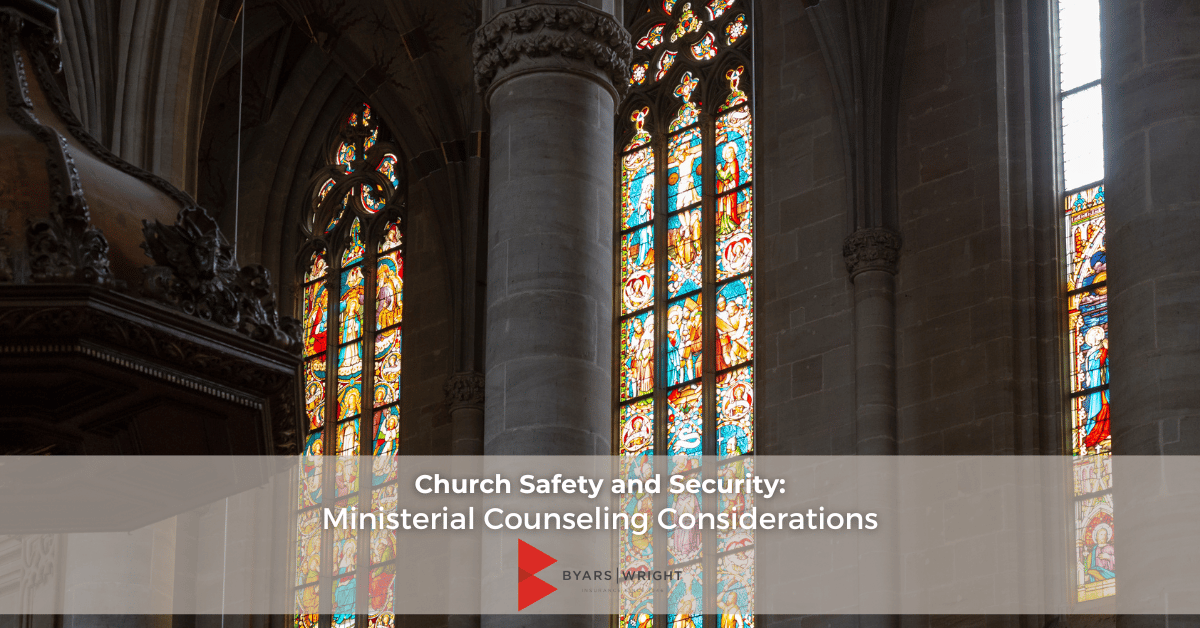
10 Oct Church Safety and Security | Ministerial Counseling Considerations
As a religious organization, there are services you provide to members that can open you up to significant risk. These risks are related to abuse allegations, ministerial counseling, premise liabilities, vehicle accidents, and privacy and employment issues. Among other risks, these are key liability concerns for religious organizations. Therefore, risk management is critical. In this blog, we’ll discuss ministerial counseling considerations that could be applied to your organization.
Religious organizations should know:
– When to refer cases to a professional
– When the rules of confidentiality apply
– How to avoid undue influence
– How to reduce sexual misconduct risks
Each risk has its own set of risk management strategies. Providing your employees with counseling guidelines helps identify what procedures to follow for each issue. Keep reading to explore some of those procedures and recommendations.
Referring Cases to a Professional
If a client is coming to the organization for spiritual counseling, the clergy counselor must know when the needs of the member exceed the help they can provide. Instances of this can include substance abuse treatment and severe mental health issues. Not referring a member to a qualified professional can lead to liabilities for your organization.
To reduce an organization’s risk, it’s important that there is a referral system in place.
A Client’s Right to Confidentiality
Another area counselors need education in relates to a client’s right to confidentiality. When a client comes to one of your clergy counselors for spiritual counseling, any information given during the sessions is confidential.
If the clergy counselor breaches this duty of confidentiality, it opens the religious organization up to legal liabilities and can give the organization a bad reputation. It’s important for organizations to train their staff on what appropriate counselor confidentiality looks like and how it can come into breach.
Avoiding Undue Influence
Religious organizations should document all their charitable donations. Another consideration religious organizations should examine relates to undue influence on members of the church. This arises when an individual donates their money to the church when they die. This has the potential to be a problem if the remaining family chooses to contest it.
Your church should also inform members that if they intend to donate money to the church when they die, that member should ensure there is documentation in place stating the donation was made independently.
Reducing Sexual Misconduct Risks
Religious organizations that offer counseling must be vigilant, as claims of sexual misconduct during a counseling session can arise. To help protect your members and avoid sexual misconduct allegations, organizations can put safeguards in place for counseling sessions. Religious organizations that use counselors must ensure these individuals have training in child abuse reporting. Put simply, a counselor must know when and how to make a report.
To prevent liability risks, organizations should stay away from controversial therapies, like age regression or conversion therapy. Avoiding these types of therapies will protect your religious organization’s reputation and help you avoid significant legal costs.
Moving Forward
Religious organizations face numerous risks on a daily basis. If not properly addressed, these risks can detract from the core mission of a religious organization. But, through proper risk management, these risks could be low.
For more information on how to mitigate risk in your religious organization, contact or connect with Byars|Wright Insurance today. Our team of insurance professionals is here to help.


